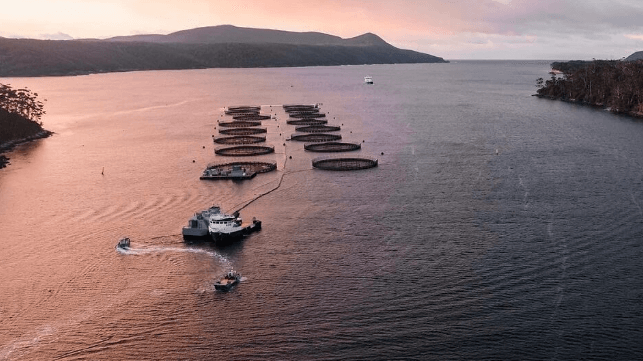Environmentalists Blockade Fish Farm Vessel in Tasmania

Environmentalists and anti-fish farm campaigners have taken the fight against commercial salmon farming in Tasmania, Australia a notch higher after blocking a fish transport vessel from unloading salmon at Long Bay on the Tasman peninsula.
The NGO Bob Brown Foundation (BBF) said that for the first time ever, its activists and campaigners have blocked top regional salmon producer Tassal Group’s operations as the company attempted to return salmon to Long Bay. Using community boats, Tassal’s vessel, the Aqua Spa, was prevented from mooring alongside the 16 empty pens in Long Bay and pumping live juvenile salmon into the open cages.
The 84-metre-long Aqua Spa is used for bathing fish in freshwater and transporting juvenile fish from Tassal’s nurseries to the grow-out areas in Long Bay. Bathing is done in freshwater to protect against amoebic gill disease.
Members of the community have been calling on the company to remove the Long Bay pens, as recommended by the Tasmanian Legislative Council's recent finfish inquiry. Tassal is Australia’s leading seafood producer and the largest producer of Atlantic salmon.
“Today’s resistance is because Tassal refuses to listen to the community. With IMAS reports confirming the damage this toxic industry does, along with seeing it with our own eyes, neither Tassal nor the government has done anything to address community concerns. So, they have left us no choice but to defend this beautiful place ourselves,” said Alistair Allan, BBF Fish Farm campaigner.
Australian politician and Greens Environment and Biodiversity spokesperson Rosalie Woodruff has come out in support of the BBF blockade and protests against Tassal.
“Long Bay is a clear example of how the Environment Protection Authority is failing to protect Tasmania’s precious marine ecosystems. Once again, they have instead protected the commercial interests of massive industrial fish farm operators,” said Woodruff.
Tasmanians have watched the salmon industry grow explosively from a few small pens in the 1980s to a billion-dollar behemoth. Over the last three decades the value of the island’s salmon industry has grown to around $1 billion and there are plans to double that by 2030. The industry directly employs 12,000 people.
Environmentalists and conservationists reckon that the farmed salmon industry presents a catastrophic threat to marine life and trust in food safety due to risks like toxins and chemicals in food, dead zones on the seafloor to jellyfish and toxic algal blooms.
The BBF-led protests come soon after the Tasmania Department of Natural Resources and Environment released seal deterrent and seal mortality data for the period from January 2021 to June 2022 that show continued widespread use of underwater explosives and bean bags by salmon farming companies.

that matters most
Get the latest maritime news delivered to your inbox daily.
The data show that to deter the seals, the industry has increased the use of seal crackers (underwater explosive) and bean bags. During the period, a total of 25 seal deaths attributable to salmon farming were reported, with Huon Aquaculture accounting for 20 and Tassal five.
While the Tasmanian Legislative Council's inquiry has recommended the pens be removed from shallow, protected waters due to their impact on the ecosystem, the government has not taken any action.
